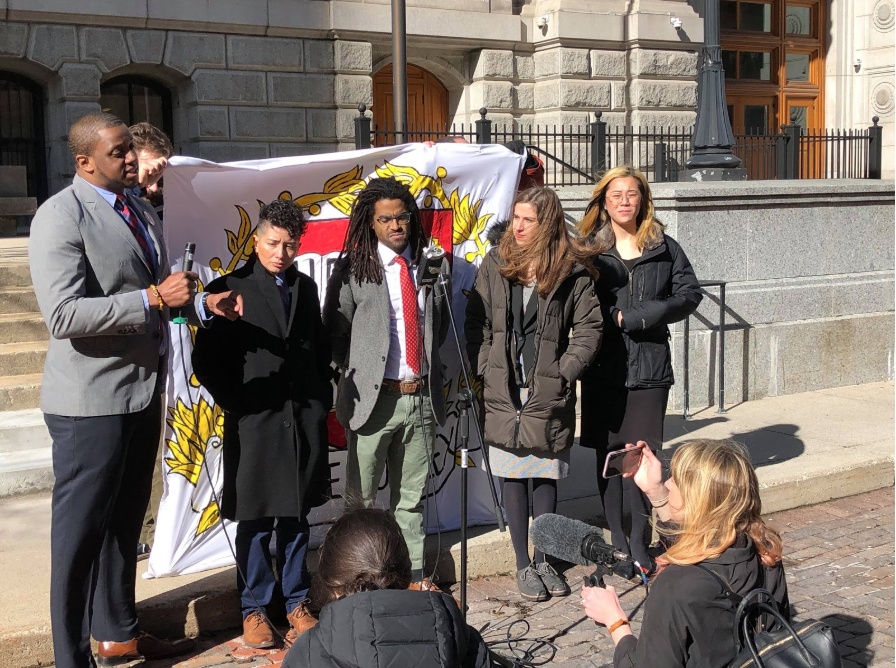A Reparatory Justice Initiative that seeks to Sever Harvard's Financial Ties to the Prison-Industrial Complex
school Our Approach
We are Harvard students working with our communities to end Harvard’s investments in the prison-industrial complex. We advocate for Harvard’s total divestment from all corporations whose existence depends on the capture, caging, and control of humans. HPDC aims to facilitate ongoing reparatory justice processes by pressuring the university to reinvest the divested funds into communities directly impacted by the prison-industrial complex and to create funded academic projects that employ scholars and organizers to teach and research creative approaches to eliminate structural social harms in ways that do not rely on prisons and police.

Harvard profits off of hundreds of holdings within the prison-industrial complex
Some of these companies like the private prison operators CoreCivic and the GEO Group, to which Harvard is connected through a related Mid-Cap ETF fund, profit from owning immigrant jails that serve as sites of detention for the many children separated from their parents and abuse, driving people to attempt suicide. Other companies, including the insurance giant Tokio Marine Holdings Inc., a key player in the $2 billion a year bail-bond industry, make money off millions of people, like Kalief Browder, who are simply too poor to finance their freedom and turn to private bail bondsmen. Due to the fact that much of the University’s investments remain opaque, these examples, drawn from a sample of just $425 million — barely 1% — of its total endowment holdings, likely represent only a small fraction of Harvard’s investments in prisons.
39.2 Billion
Dollar Harvard Endowment
425 Million Dollars
That We Know About
38.775 Billion
Endowment Dollars We Know Nothing About
We are concerned about how Harvard is funding itself through the exploitation of incarcerated people, their families, and communities — and helping to perpetuate the American institution of slavery in spirit and in practice.
How did the Harvard Prison Divestment Campaign get started? + -
We started as an information campaign in early 2018 to raise awareness about the university’s financial involvement in the prison industry and have evolved into a divestment and reparatory justice campaign.
What does the Harvard Prison Divestment Campaign aim to achieve? + -
Our demands are simple. The Harvard Management Company must divest all of Harvard’s holdings in companies that profit from the prison-industrial complex and reinvest in communities disproportionately affected by mass incarceration. We seek to achieve this goal by forcing Harvard to:
- Publicly disclose and release endowment holdings in all funds with stock in companies whose existence depends on the prison-industrial complex. Provide an authenticated copy of endowment holdings to the Harvard community in the interests of transparency, prior to divestment and regularly thereafter.
- Apportion a significant percentage of divested funds towards companies, organizations, and initiatives in Cambridge and Boston that are led by people directly impacted by the prison-industrial complex. Establish an accountability structure for the appropriate redistribution of funds, with timed mandates and oversight accorded to people and communities who have been the central victims of mass incarceration.
- Launch a cross-school initiative to research and teach creative ways to eliminate structural social harms that do not rely on prisons and police. Develop funded academic projects (e.g. scholarships, centers, institutes, departments, and concentrations) that employ formerly incarcerated people, organizers, and scholars. End discrimination against and create opportunities for current and formerly incarcerated persons.
How can I support the Harvard Prison Divestment Campaign? + -
You can support the Harvard Prison Divestment campaign in many ways. Sign our petition supporting our demands, like and follow us on Twitter and Facebook, and add yourself to our mailing list. Paper your school and community flyers!
If you want to get more involved, send us a message at harvardpdc@gmail.com for information about joining our core planning team or one of our working groups based in each of Harvard’s many schools.
Do prisoners support HPDC? + -
Yes, we are in communication with folks incarcerated in Massachusetts, who support the campaign. We are also partnered with the Emancipation Initiative, an organization led by incarcerated people working for universal prisoner suffrage and for an end to life without parole sentencing. Please check out and support their important work.
How widely supported is HPDC on campus and in the community? + -
Harvard College students have already expressed their desire for Harvard to divest. On November 15, 2018, 77.2% of undergraduate students voted in favor of a measure, sponsored by HPDC, calling on the Harvard Management Company to divest from the prison-industrial complex.
Have other institutions of higher education divested from the prison-industrial complex? + -
In June 2015, Columbia Prison Divest fought and succeeded in making Columbia the first university to divest from private prisons. In December 2015, the UC Afrikan Black Coalition won its campaign when the University of California system agreed to divest $30 million of its holdings in companies that operate in private prisons. Since 2015, activists at California State University Los Angeles, Georgetown University, Stanford University, the University of Southern Florida, Hampshire College, and Princeton University have won divestment and/or secured pledges from their universities to never invest in private prisons in the future.
For a comprehensive list of campaign victories, see this timeline from Freedom to Thrive.
What is the prison-industrial complex? + -
We follow educator and organizer Rachel Herzing’s definition of the prison-industrial complex as “the overlapping interests of government and industry that use surveillance, policing, and imprisonment as solutions to what are, in actuality, economic, social, and political ‘problems’.” It is a system that has ensnared almost 2.3 million people in 1,719 state prisons, 102 federal prisons, 1,852 juvenile correctional facilities, 3,163 local jails, and 80 Indian Country jails as well as in military prisons, immigration detention facilities, civil commitment centers, state psychiatric hospitals, and prisons in the U.S. territories. See the Prison Policy Initiative’s work for facts and statistics on the prison-industrial complex.
Why divestment? + -
Divestment is a time-tested form of political action. In the 1980s, activists forced states, municipalities, corporations, and universities to stop doing business with apartheid South Africa and divest from all South African companies. Though Harvard itself failed to fully divest, the global divestment campaign is credited with pressuring the white minority government into holding the country’s first democratic elections and thereby ending apartheid.
Harvard itself has acknowledged the effectiveness and ethical merit of divestment through its public comments and past actions. The university divested from the tobacco industry in 1989; and in 2005 and 2006, Harvard divested from certain companies involved in oil production in Sudan during the genocide.
